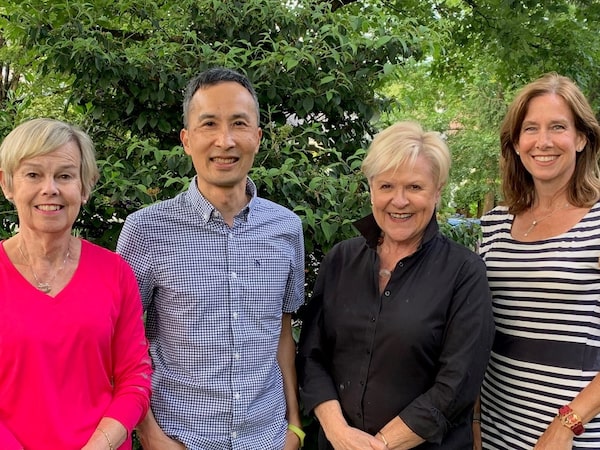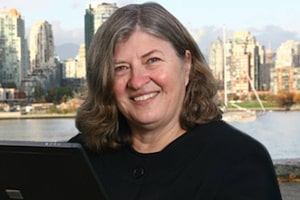
Jane Frost, Corey Sue, Ginny Richards and Marie Rogers have all resigned as board members to the Non-Partisan Association board in Vancouver.Handout
Vancouver’s once-dominant civic party, which almost won control of city council in the past election, is showing increasing signs of fracture after four of its 15 board members resigned, saying the board is ineffective and irrelevant.
And the Non-Partisan Association’s mayoral candidate in the 2018 election says the resignations are further indications that the city will need to form a new civic party to provide a choice for voters who are fiscally right of centre and socially to the left.
The NPA’s troubles are setting the scene for a tumultuous reorganization of the party and local politics in advance of the 2022 civic election.
“There’s definitely a movement going on,” said Ken Sim, who has suggested that he plans to run again. His former backer, businessman Peter Armstrong, has been fundraising for him for several months.
Vancouver’s civic politics, unlike most municipalities across the country, operate under a system of locally based political parties, rather than independents with no official links to organized political entities. The current council is made up of four parties and an Independent mayor, Kennedy Stewart.
The NPA, the oldest Vancouver political party, was a cohesive force for most of the 20th century, dominating council with mayors such as Tom Campbell, Gordon Campbell and Philip Owen. Gordon Campbell went on to become a B.C. premier.
Mr. Sim said there are people “on the left and the NDP reaching out, teachers, business owners, setting up meetings and raising money” because they think neither the NPA nor the current council leadership are viable options.
While he wouldn’t say that he was definitely forming a new party, “don’t be surprised if you see something in the next six months,” he hinted.
The resignations come after other signs of disagreement in the party. One of the NPA’s five elected councillors, Rebecca Bligh, quit the party last fall and now sits as an Independent after a board election in November brought in an unusual group of newcomers.
They included Chris Wilson, a former bureau chief for far-right media outlet RebelNews, and David Chen, who formed his own party to run against the NPA in the past election.
Ms. Bligh, who has done work with Mr. Sim in the past, said the election showed a swing to the right that she couldn’t agree with.
The four board members who resigned call themselves “moderate residents,” but did not cite specific examples of a right-moderate split.
Instead, says Jane Frost, one of the four, they found themselves thwarted by a group of new board members who don’t seem interested in holding meetings, speaking out on important issues facing the city or including all current and potential NPA members.
“I fear for what this means,” Ms. Frost says. She described herself as being part of the more traditional “old-school” NPA that was relatively moderate on the right. The others included Virginia Richards, Corey Sue and Marie Rogers.
The move is sure to set off more division among both party members and those looking to support a centre-right party in city elections. Many of these potential voters are not sure where to go in spite of their dissatisfaction with the leadership of the current mayor, and the often erratic moves of the four-party council he heads.
Even though the party elected five councillors originally and came within 1,000 votes of having Mr. Sim elected over Mr. Stewart, it has not shown signs of the unity it once displayed.
In the past, the NPA managed to unite federal Liberals and federal Conservatives as a bloc voting against the left-wing COPE party, the main alternative for decades. As a result, it became an attractive networking vehicle for many would-be politicians and business people.
But in the 2000s, a new-style COPE and then Vision Vancouver, which brought together a coalition of NDPers and centrist Liberals, along with union supporters and private developers, dominated for much of the past two decades.
The current NPA councillors do not appear to have joint positions on critical issues, and sometimes end up voting against each other or introducing motions that don’t get the support of all of their party colleagues.
In the recent contentious vote on a 28-storey rental tower on Broadway, three councillors – Lisa Dominato, Sarah Kirby-Yung and Melissa De Genova – supported it, while Colleen Hardwick did not.
But one long-time NPA board member who has remained, even though he often voted with the four who have left on board decisions, said he thinks the party is poised to regain its strength and win in the next election.
“I think the party’s going to be okay if they get themselves together,” said Dave Pasin. “I understand their frustration [those who resigned] but I think the problems can be overcome.”
We have a weekly Western Canada newsletter written by our B.C. and Alberta bureau chiefs, providing a comprehensive package of the news you need to know about the region and its place in the issues facing Canada. Sign up today.
 Frances Bula
Frances Bula